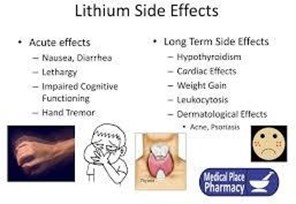The nurse is admitting a male client who takes lithium carbonate twice a day. Which information should the nurse report to the healthcare provider immediately?

Five-pound (2.3 kg) weight gain.
Nausea and vomiting.
Short-term memory loss.
Depressed affect.
The Correct Answer is B
Choice A rationale:
A five-pound weight gain in a client taking lithium carbonate is significant. however, the timeframe of the weightgain is to be known. Choice B rationale:
Nausea and vomiting are known side effects of lithium that should be reported as they can cause electrolyte imbalance.
Choice C rationale:
Short-term memory loss is a potential side effect of lithium, but it may not require immediate reporting unless it significantly affects the client's daily functioning or is associated with other concerning symptoms.
Choice D rationale:
A depressed affect is a symptom that should be addressed as part of the client's ongoing psychiatric care, but it may not warrant immediate reporting unless it is severe and requires a change in the treatment plan. The priority in this case is the potential lithium toxicity indicated by the weight gain.
Nursing Test Bank
Naxlex Comprehensive Predictor Exams
Related Questions
Correct Answer is ["A","B","C"]
Explanation
The assessment findings that require immediate follow-up by the nurse are: muscle cramps, tingling sensation in arms and legs, and lightheadedness.
These are signs of electrolyte imbalance, which can be caused by missed dialysis sessions, dehydration, or infection. Electrolyte imbalance can lead to serious complications such as cardiac arrhythmias, seizures, or coma.
The nurse should monitor the client's vital signs, neurological status, and cardiac rhythm, and notify the physician for further orders. The nurse should also assess the client's fluid status, hydration, and nutritional intake, and provide education on the importance of adhering to the dialysis schedule and dietary restrictions.
Correct Answer is ["E","F","H"]
Explanation
Choice A rationale:
This order is useful to evaluate the client's electrolyte levels, renal function, and acid-base balance, as she has ERSD and missed her dialysis session. She may have hyperkalemia, metabolic acidosis, or uremia, which can affect her cardiac and neurological status.
Choice B rationale:
This order is helpful to assess the client's cardiac structure and function, as she has a history of CAD and HTN and may have developed heart failure or valvular disease.
Choice C rationale:
This order is beneficial to rule out any intra-abdominal causes of the client's nausea and poor appetite, such as infection, obstruction, or bleeding.
Choice D rationale:
This order is necessary to identify any possible source of infection or sepsis, as the client has been ill for 3 days and has a history of diabetes, which can impair her immune system.
Choice E rationale:
This order is important to assess the client's cardiac and pulmonary status, as she has a history of CAD and is presenting with chest discomfort and lightheadedness, which could indicate a cardiac event or pulmonary edema.
Choice F rationale:
This order is essential to monitor the client's heart rate and rhythm, as she has a history of CAD and HTN and is at risk for arrhythmias, ischemia, and infarction.
Choice G rationale:
This order is important to evaluate the client's hematological status, as she has ERSD and may have anemia, leukocytosis, or thrombocytopenia.
Choice H rationale:
This order is crucial to obtain a baseline of the client's cardiac electrical activity and to detect any signs of acute coronary syndrome, such as ST-segment elevation or depression, T wave inversion, or Q waves.
Whether you are a student looking to ace your exams or a practicing nurse seeking to enhance your expertise , our nursing education contents will empower you with the confidence and competence to make a difference in the lives of patients and become a respected leader in the healthcare field.
Visit Naxlex, invest in your future and unlock endless possibilities with our unparalleled nursing education contents today
Report Wrong Answer on the Current Question
Do you disagree with the answer? If yes, what is your expected answer? Explain.
Kindly be descriptive with the issue you are facing.
